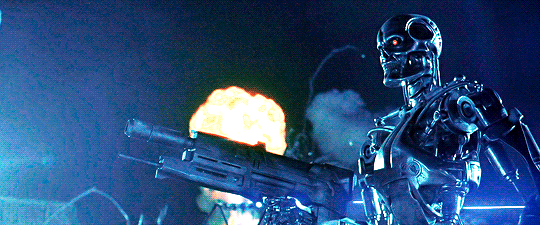I, Robot
You're wondering who I am
Machine or mannequin
With parts made in Japan
I am the modern man
Kilroy Was Here by Styx is one of the first records I owned. The lead single "Mr. Roboto" was a real departure for AOR radio in 1983 which typically featured songs about falling in and out of love and having a rockin' good time. "Roboto" signaled something deep and different, from its vocoded Japanese intro to the band's use of electronic instruments in place of the hard rock guitars their fans expected. The song's lyrics are as strange as its sound. A soliloquy from a self-proclaimed savior that just happens to be part machine. The narrator "Robert Kilroy" struggles with issues of identity and autonomy, simultaneously embracing his cyborg second skin while decrying the intrusion of technology into our lives. Who is this Robert/robot and what are the secrets he sings about keeping?
The problem's plain to see
Too much technology
Machines to save our lives
Machines dehumanize
Kilroy Was Here details a dramatic battle between good and evil. It's a sci-fi story pitting self-expression and subterfuge against censorship and subjugation. This introduction to concept albums fascinated me at a young age. While much of it seems silly now there's one theme that resonates as increasingly relevant through decades of pop culture and technological evolution: the robot as selfless entertainer.
For clarity I don't mean literal mechanical musicians. Not to deny the awesome junkyard rock of motorized acts like The One Love Machine Band, Compressorhead or The Trons. I'm talking about people adopting android identities in a pantomime of programmed personality. What inspires such pursuit and makes the practice so compelling?
There's a long tradition of cautionary tales about machines taking over mankind. Karel Čapek's 1921 play "R.U.R." introduced the idea of rebellious robots that continues to be a thrilling throughline for dystopian stories like The Terminator series. Star Trek's sinister Borg chants "resistance is futile" as it assimilates species into a cybernetic hive mind with no individual thought or will.
But what of the humans who welcome such a transformation? Artists are the last people one expects would wish to become expressionless automatons. Yet some have made the portrayal of personality-less puppets undeniably appealing.
The Kings of Techno-pop Kraftwerk confounded 1970s audiences with their "cold" music played on unfamiliar instruments. Critics took issue with their simplistic compositions and "lack of soul" and spontaneity as the German band embraced the industrial commoditization of monotonous roadways, nuclear power and pocket calculators. Their songs celebrate drones performing repetitive work and the motives of inanimate mannequins. It seems only natural that the stoic quartet would prefer to be represented on stage by generic looking robots with limited articulation. Despite dismissal by "real music" fans and the group's own desire to be seen as inhuman anti-celebrities, their mechanistic sound and image has been persistently cherished and influential to generations of listeners and musicians.
I am the modern man
Who hides behind a mask
So no one else can see
My true identity
Fast-forward to 1993 when French musicians Guy-Manuel de Homem-Christo and Thomas Bangalter named their new techno project in reference to a review of their previous shoegaze band as "daft punky thrash." While the pair wore masks in public to keep the focus on their music it would be several years before they donned the robot helmets for which Daft Punk is most well known. Somehow their anonymity only made the duo more intriguing.
Their music and videos demonstrate a sense of humor and serious funkiness, the latter lacking in Kraftwerk. Also unlike their robotic predecessors Daft Punk revels in the recycling of retro nostalgia as opposed to fetishism of futuristic automation. Despite their differences both groups share a desire for depersonalization. Ironically in attempts to deemphasize their humanity Kraftwerk and Daft Punk became heralded as musical prophets, enlightening audiences seeking emotional revelation via technological revolution.
Of course I don't need to educate anyone reading this about these bands. Like you I mourn the powering down of Daft Punk. What makes us so fond of these clockwork characters? Maybe it's our nature to project positive personalities onto a blank "face.” Perhaps it's appreciation for beings whose only programmed purpose is to please us. Movies like Blade Runner, A.I. and Heartbeeps foster sympathy to the plights of our tireless servomotor servants. Play-acting helps us identify with things onto which we ascribe sentience. My hope is that someday we can treat all of our fellow humans with the same empathy we extend to artificial entities.
I'm not a robot without emotions, I'm not what you see
I've come to help you with your problems, so we can be free
I'm not a hero, I'm not a savior, forget what you know
I'm just a man whose circumstances went beyond his control
*Banner image taken from an illustration by Hajime Sorayama
Cat’s Corner is a collection of commentary by Mike Langlie of Cat Temper about his early synth-fluences.







